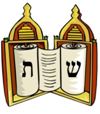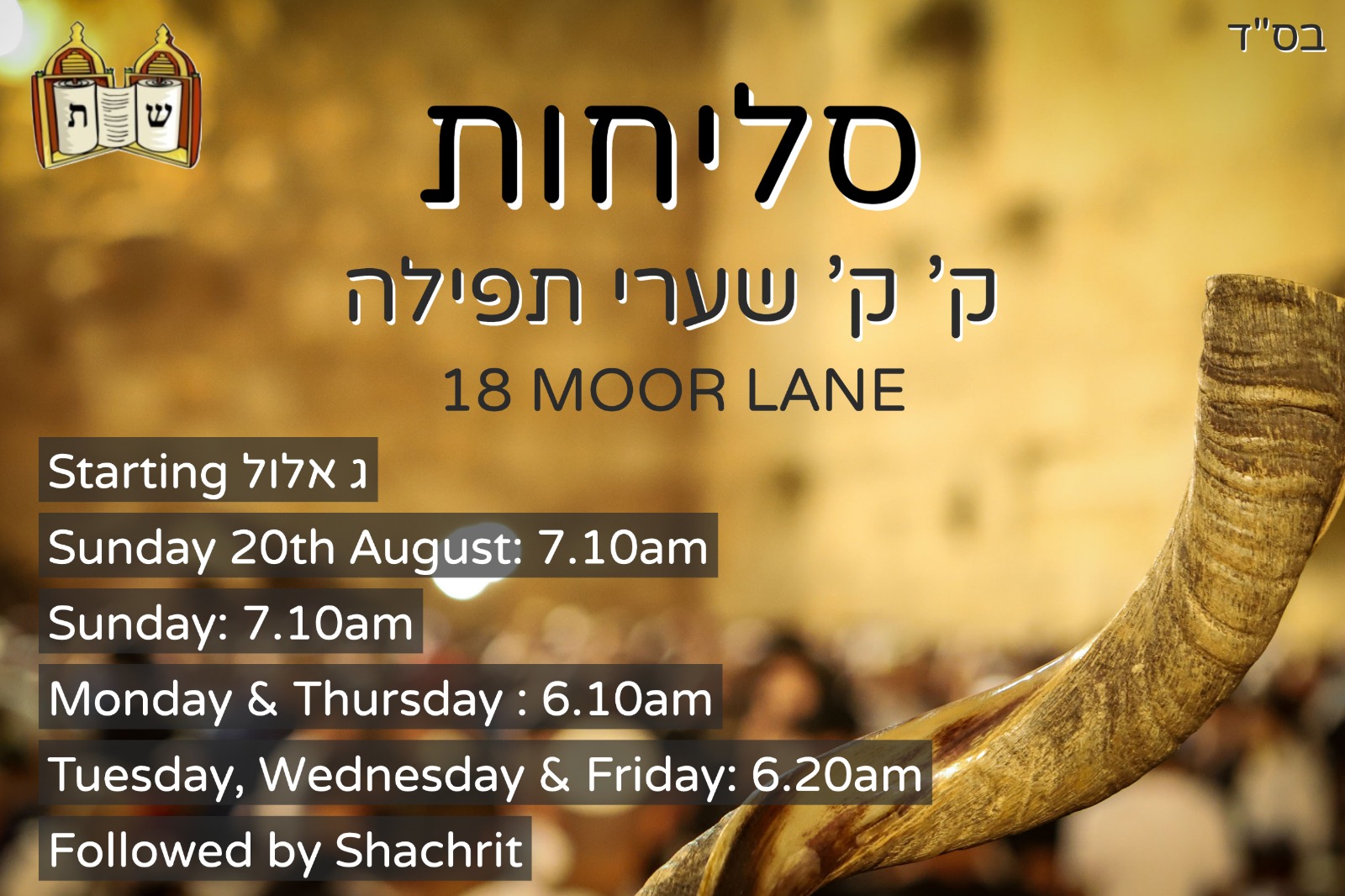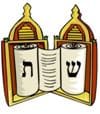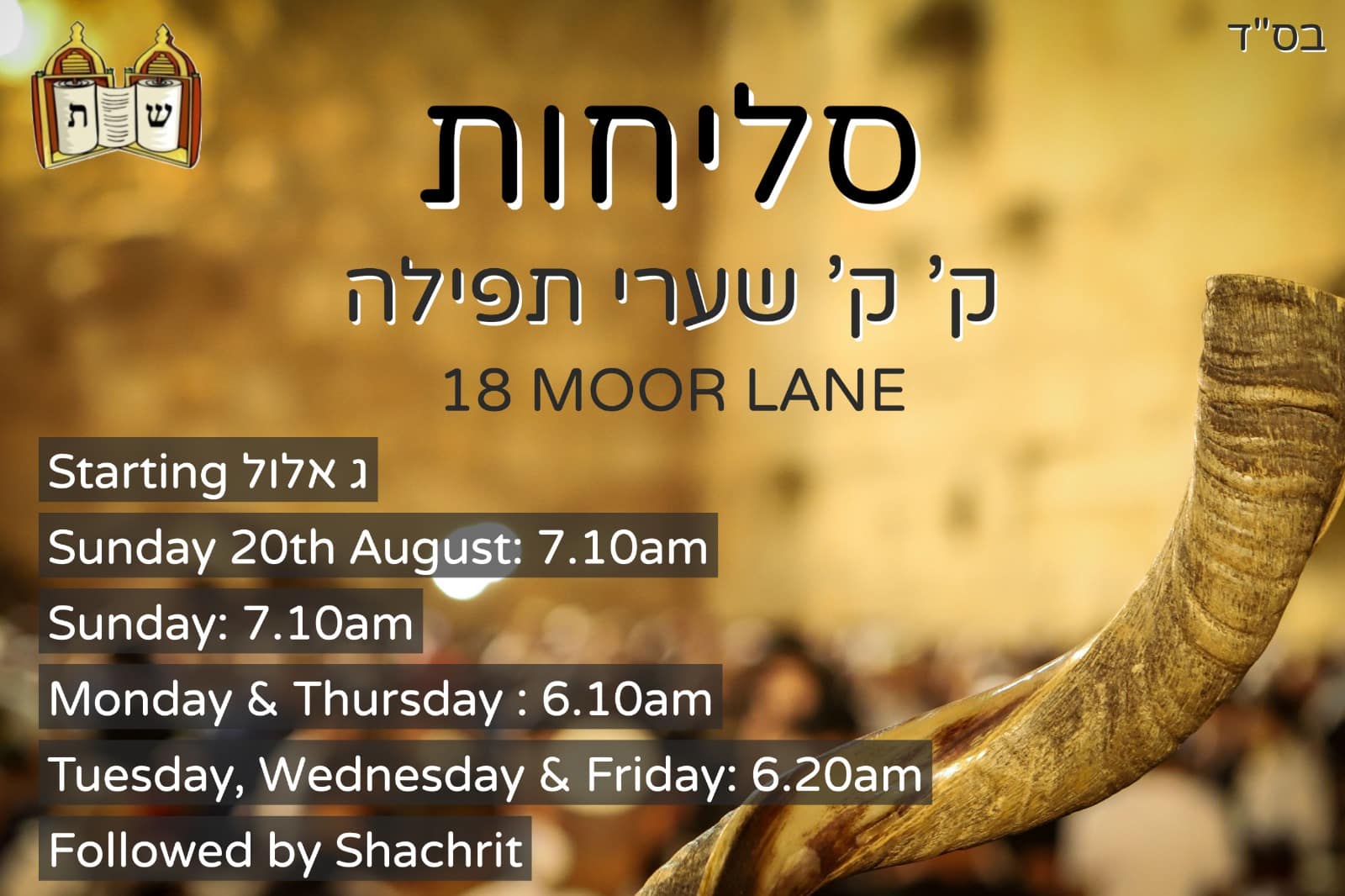
ק׳ ק׳ שׁערי תפילה



that we inform the Kahal of the Petira of
Dr Clive Coleman ע״ה
(Shelomo Dov Alexander ben Esther)
father of Mrs Michal Maman שתח״י
מן השמים תנחמו
אריכות ימים
Moorlanenews
would like to use this opportunity
to send their heartfelt condolences to
Mrs Michal Maman שתח״י
and all her family
and wish them
מן השמים תנחמו
אריכות ימים
לוח זמני תפלה לקיץ תשפ״ג
Summer Timetable 5783 – 2023
מוצאי שבת | ערבית )מוצ”ש( | סוף זמן קראת שמע | זמן שבת | פלג מנחה (תה״ד) | פלג מנחה (לבוש) | מנחה וקבלת שבת | תאריך | שבת פרשת |
Shabbat Ends | Arbit | Shema to be read before | Candles to be |
| Earliest Candle lighting | Minha & Kabbalat Shabbat* | Date | Parasha |
PM | PM | AM | PM | PM | PM | PM |
|
|
8:49 | 8:45 | 9:43 | 7:44 | 7:06 | 6:34 | 6:45 | 1/2 Sep | כי תבא |
For those not in the Bet Hakeneset, but wishing to bring in Shabbat with the Kahal, candles should be lit about 30 minutes after the time listed for Minha and Kabbalat Shabbat, unless the time listed in the ‘latest candle lighting’ column is earlier, when candles MUST be lit by that time, in all cases.



When the Jewish People dwell in the Land of Israel, its first fruits are to be taken to the Temple and given to the kohen.This is done in a ceremony that expresses recognition that it is G-d who guides the history of the Jewish People throughout all ages. This passage forms one of the central parts of the Pesach Haggadah that we read at the Seder.
On the last day of Pesach of the fourth and seventh years of the seven-year shemitta cycle, a person must recite a disclosure stating that he has indeed distributed the tithes to the appropriate people in the prescribed manner. With this mitzvah Moshe concludes the commandments that Hashem has told him to give to the Jewish People. Moshe exhorts them to walk in Hashem’s ways because they are set aside as a treasured people to Him.
When the Jewish Peoplecross the Jordan River they are to make a new commitment to the Torah. Huge stones are to be erected and the Torah is to be written on them in the world's seventy primary languages, after which they are to be covered over with a thin layer of plaster. Half the tribes are to stand on Mount Gerizim, and half on Mount Eval, and the levi'im will stand in a valley between the two mountains. The levi'im will recite twelve commandments, and all the people will answer “amen” to the blessings and the curses. Moshe then details the blessings that will be bestowed upon the Jewish People, blessings that are both physical and spiritual. However, if the Jewish People do not keep the Torah, Moshe details a chilling picture of destruction, resulting in exile and wandering among the nations.
Ohr Somayach Institutions www.ohr.edu

פרטים בענין אמירת הסליחות
שאלה: מה ההבדל בין “ישראל העניים” ל”ישראל הדלים”?
תשובה: בסליחות אנו אומרים “עשה למען ישראל העניים”, ואחר כך “עשה למען ישראל הדלים”. והגאון יעב”ץ (בשאלת יעב”ץ סימן פה) כתב, שהעני הוא אדם שאין לו כסף. ואילו דל הוא אדם שנעשה כל כך עני, עד כדי כך שנעשה חולה מחוסר כל. ולכן אומרים קודם “עשה למען ישראל העניים”, ואחר כך “עשה למען ישראל הדלים”. והגר”א פירש להיפך, שהעני הוא מי שנעשה חסר כל, ואילו הדל, הוא אדם שהיה עשיר וירד מנכסיו, וכעת הוא דל, אף על פי שאינו עני לגמרי. ומרן זצ”ל בספרו (ימים נוראים עמוד יח) סיים על כך: ועל כל פנים מבקשים למען העניים ולמען הדלים, אשר בצרתם, גם ה' מצטער.
שאלה: אצלינו בבית הכנסת יש קושי גדול להתחיל את הסליחות אחר חצות. האם ישנה אפשרות להתחיל עשר דקות לפני חצות?
תשובה: עיקר הסליחות הם מ”שבט יהודה” ואמירת י”ג מידות (ה' ה' אל רחום וכו') ועוד מעט פסוקי תפלה. אבל אמירת “אשרי יושבי ביתך” ותחילת הסליחות, והוידוי, אינם בגדר “סליחות” שאין לאמרם לפני חצות. לכן, במקום צורך נראה שיוכלו להתחיל בסליחות (אשרי יושבי ביתך), וכשיגיעו ל”שבט יהודה”, ידלגו ל”ריבונו של עולם”, ואחר כך יחזרו ל”שבט יהודה”. וכבר היה מעשה כיוצא בזה עם רב קהלה אחד (הוא הרב הגאון רבי שמעון מורסיה שליט”א, נכדו של הגאון רבי חזקיה שבתי זצ”ל), שרצה להנהיג כן, ומרן זצ”ל התבונן בזה והשיב שיוכלו לעשות כן.
שאלה: בית הכנסת שלנו, העמידו חזן בעל קול יפה מאד, והוא מתגלח בתער, מה לעשות?
תשובה: בסדר רב עמרם גאון (ח”ב סימן נה) כתוב: ושאלו לפני בני הישיבה, שליח ציבור שאומרים עליו דברים רעים, האם מותר להדיח אותו ממשרתו ולמנות שליח ציבור אחר במקומו? והשיבו כך: וכי זו שאלה? הרי בודאי שהדין נותן שיש להדיח אותו ולהכניס אחר תחתיו, כי הוא הרי המתווך בין הציבור לבין אביהם שבשמים, והוא צריך להיות צדיק וישר ונקי מכל דופי, ואם אינו כן, עליו נאמר “נתנה עלי בקולה על כן שנאתיה”. וזהו בשליח ציבור של שאר ימות השנה, אבל לגבי שליח של הימים הנוראים, הרי הדין הוא חמור יותר, כי יש צורך להרבות סליחות ותחנונים. והביא כל זה להלכה מרן רבינו עובדיה יוסף זצ”ל, וכתב שאם השליח ציבור מגלח זקנו בתער, וכל שכן אם הוא מחלל שבת, שנפסל מלכהן כשליח ציבור. (חזון עובדיה ימים נוראים עמוד לו).
Some Details Regarding the Text of Selichot
Question: In the Selichot text, what is the difference between “Israel, the poor” and “Israel, the downtrodden”?
Answer: Within the Selichot, we recite “Act on behalf of Israel, the poor,” followed by “Act on behalf of Israel, the downtrodden.” Hagaon Ya’abetz (She’elat Ya’abetz, Chapter 85) explains that a poor man is someone who does not have money, while a downtrodden man is one who is so poor that he becomes ill as a result of lacking his basic needs. That is why we begin with “Israel, the poor” and then recite “Israel, the downtrodden.” The Gaon of Vilna explains that the opposite is true: “Poor” refers to someone who lacks all, while “downtrodden” refers to a wealthy man who has since lost his wealth and becomes needy, however, he does not suffer from complete poverty. Maran zt”l (in his Chazon Ovadia- Yamim Nora’im, page 18) concludes this discussion by saying: “In any event, we beseech Hashem on behalf of the poor and downtrodden, for Hashem participates in their suffering.”
Question: In our congregation, it is extremely difficult to begin Selichot precisely at halachic midnight. Can we begin ten minutes beforehand?
Answer: The primary portions of Selichot are from “Shevet Yehuda” and on, including the Thirteen Attributes of Mercy (“Hashem, Hashem, El Rachum etc.”) and other select verses of prayer and supplication. Nevertheless, “Ashrei,” the beginning of Selichot, and Viduy (the confessional prayer) are not considered the Selichot that one may not recite before halachic midnight. Therefore, when there is a need to do so, the congregation may begin Selichot with “Ashrei” before halachic midnight and when they reach “Shevet Yehuda,” they should skip to “Ribbono Shel Olam” preceding Viduy, and then, once halachic midnight arrives, the congregation should return to “Shevet Yehuda.” There was a similar scenario with a certain community rabbi (named Hagaon Harav Shimon Mursaya Shlit”a, grandson Hagaon Harav Chizkiyahu Shabtai zt”l, head of the Jerusalem Bet Din) who wished to do this and when this idea was posed to Maran zt”l, he pondered it a bit and agreed that it was correct.
Question: Our synagogue has hired a Chazzan with a beautiful voice; however, he shaves his beard with a razor. What should be done?
Answer: A similar question is recorded in Seder Rav Amram Gaon (Volume 2, Chapter 55): “It was asked before the members of the Yeshiva whether it is permissible to dismiss a Chazzan about whom bad things are being said and to replace him with someone else. They replied, ‘Is this even a question? He must certainly be replaced, for he is the emissary between the congregation and their Father in Heaven. He must therefore be righteous, upstanding, and clean of any wrongdoing. If he is not, the verse states in regard to him, She raised her voice against me, therefore I hated her.’”
This applies to a Chazzan throughout the course of the year. This is especially true regarding a Chazzan for the Days of Awe, this is even more severe, for there is increased need for more prayers and supplications. Maran Rabbeinu Ovadia Yosef zt”l quotes all this as Halacha and rules that if a Chazzan shaves with a razor, and certainly if his publicly desecrates the Shabbat, he is disqualified from serving as a Chazzan (see Chazon Ovadia, ibid., page 36).














